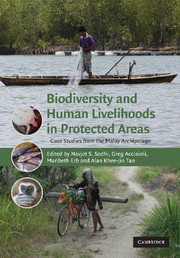Book contents
- Frontmatter
- Contents
- List of contributors
- Acknowledgements
- 1 General introduction
- Part I Conservation needs and priorities
- Part II Conservation with and against people(s)
- Part III Legal and governance frameworks for conservation
- 23 Introduction to Part III
- 24 Protected-area management in Indonesia and Malaysia: the challenge of divided competences between centre and periphery
- 25 Protecting sovereignty versus protecting parks: Malaysia's federal system and incentives against the creation of a truly national park system
- 26 What protects the protected areas? Decentralization in Indonesia, the challenges facing its terrestrial and marine national parks and the rise of regional protected areas
- 27 Learning from King Canute: policy approaches to biodiversity conservation, lessons from the Leuser Ecosystem
- 28 Conclusion to Part III
- 29 General conclusion
- Index
23 - Introduction to Part III
from Part III - Legal and governance frameworks for conservation
Published online by Cambridge University Press: 12 November 2009
- Frontmatter
- Contents
- List of contributors
- Acknowledgements
- 1 General introduction
- Part I Conservation needs and priorities
- Part II Conservation with and against people(s)
- Part III Legal and governance frameworks for conservation
- 23 Introduction to Part III
- 24 Protected-area management in Indonesia and Malaysia: the challenge of divided competences between centre and periphery
- 25 Protecting sovereignty versus protecting parks: Malaysia's federal system and incentives against the creation of a truly national park system
- 26 What protects the protected areas? Decentralization in Indonesia, the challenges facing its terrestrial and marine national parks and the rise of regional protected areas
- 27 Learning from King Canute: policy approaches to biodiversity conservation, lessons from the Leuser Ecosystem
- 28 Conclusion to Part III
- 29 General conclusion
- Index
Summary
The chapters that follow seek to assess the efficacy of the laws, policies and institutions that governments have established for protected-area management in Indonesia and Malaysia. In the process, the chapters analyse systemic governance problems such as the failure of laws (and lawmakers) to respond to the biological, sociological and political tensions inherent in protected-area management. Underlying such concerns is the practical problem of how different levels of government (at the federal/central, state/provincial and village/local interstices) may actually be working at cross-purposes in law-making and policy-setting, rather than in a coordinated and coherent fashion. In particular, the political challenges of federalism in Malaysia and the more recent regional autonomy movement in Indonesia will be assessed in relation to their impact on protected areas and local communities.
At its core, the problem is one of governance. The integrity of designated protected areas, be these terrestrial or marine areas, depends on the sanctity of their boundaries and the accommodation of competing uses. These are only possible if potentially conflicting priorities such as local communities' livelihoods, natural-resource extraction and spatial planning can be equitably and predictably reconciled. Consequently, protected-area management and biodiversity conservation must be conducted in a manner that takes into account the myriad economic activities (both legal or otherwise) that occur outside such areas, the encroachment that may take place into protected areas and the buffer zones around them and the legitimate customary rights of access enjoyed by communities living off the resources in these areas.
Information
- Type
- Chapter
- Information
- Biodiversity and Human Livelihoods in Protected AreasCase Studies from the Malay Archipelago, pp. 349 - 352Publisher: Cambridge University PressPrint publication year: 2007
